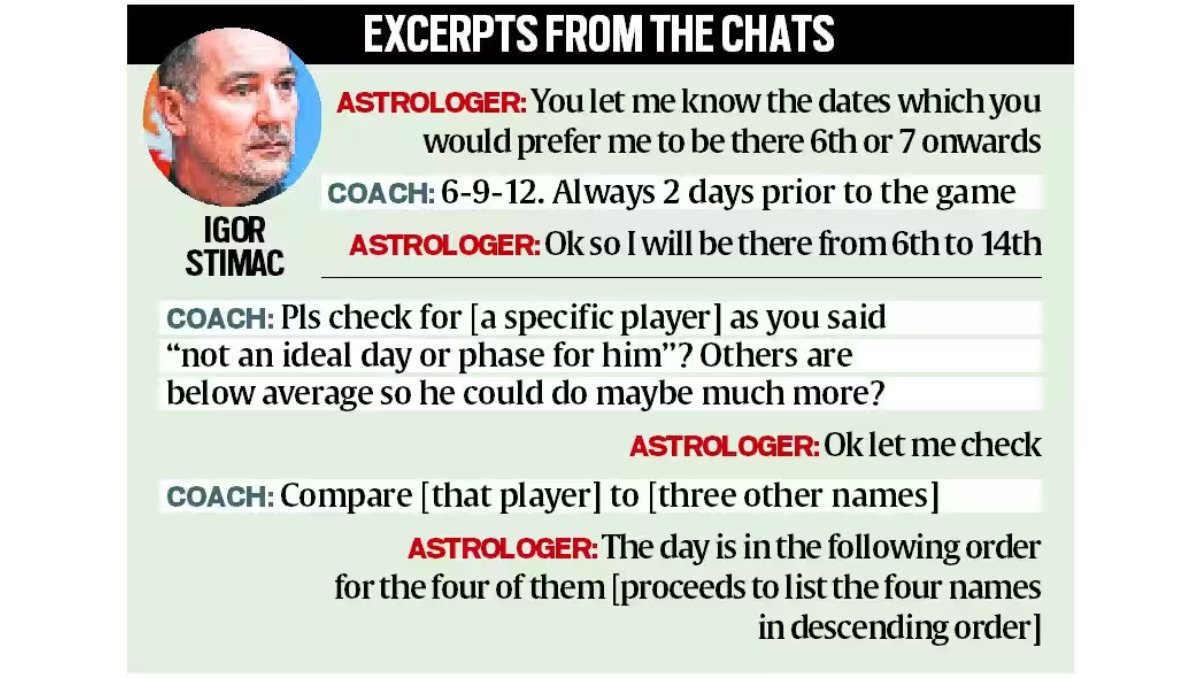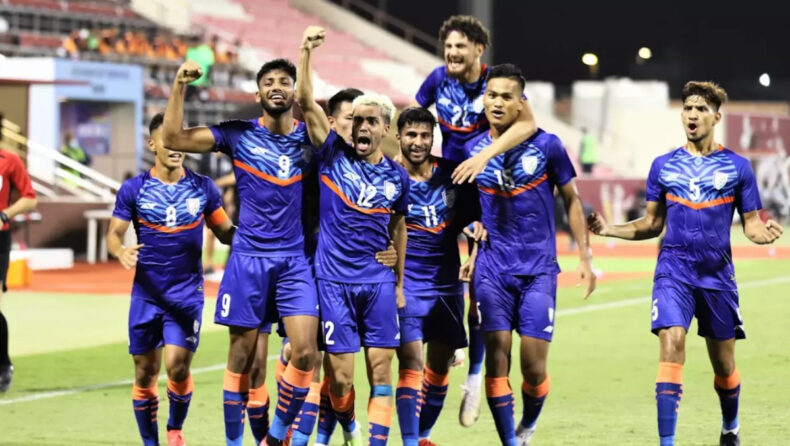Igor Stimac, head coach for the Indian football team, has revealed that he selected players for matches after suggestions from an astrologer recommended by the Indian football federation,
Table of Contents
Data science who?
In an interview with the Indian Express, Stimac disclosed that Bhupesh Sharma, an astrologer from Delhi-NCR, has been present as an advisor behind some managerial decisions like choosing which players to start a match with and which to place as substitutes.
As the Indian Express learnt, there are an estimated 100 messages between Stimac and Sharma between May and June 2022. It was a crucial period for the men’s football team which opened with a friendly against Jordan, followed up by three qualifying matches with Cambodia, Afghanistan and Hong Kong for the AFC Asian Cup, with the cup tournament also acting as a qualification process for the 2026 World Cup.
The process involved Stimac getting in touch with Sharma before every match, as seen on June 9th last year, two days before an out of shape and injury-ridden Indian team went up against Afghanistan in Kolkata. The chats showed Stimac greeting Sharma, before asking him to check the “charts” for each player from a “list” for the upcoming game, while also mentioning the kickoff time of 8:30 pm.
The “list” in question consisted of names of 11 players most likely to start the match, and within a few hours, Sharma had went through the list and gave his comments, marking players as “good”, needing to avoid overconfidence, “below average day”, “good day” but advising against over-aggression, or “not recommended”.

Stimac made suitable changes, and with an hour to left for kickoff on June 11, the squad list was released and two established players whose fortunes weren’t deemed to be favourable according to the astrologer, were left out.
These conversations, which were far from infrequent, raise questions on the functioning and integrity of the All India Football Federation (AIFF), especially as India enters yet another period filled with crucial matches on the road to potential World Cup qualification. One can also raise doubts on how crucial information regarding team selection can be left exposed to an “outsider” for potential misuse.
How the arrangement was made
Kushal Das, who was the secretary-general of AIFF at that time, was the one who advised Stimac to use Sharma’s services. Having met him at a meeting, Das was acquainted by Sharma’s impressive resume, having worked with telecom companies and Bollywood personalities in the past. Sharma’s proposition was enticing; with astrological timings and information about the current state of players, people can be motivated to make the right decisions.
Das said that he and Stimac were admittedly feeling uncertain about India’s chances to qualify for the Asian Cup, and prioritised qualification above anything else. This was, according to Das, the motive behind getting Sharma in touch with Stimac for a trial of sorts, with the ex-Croatian international being left “convinced”, Das said.
Stimac provided his account and said that he was convinced (by others) to only look into the potential impact that Bhupesh’s astrology could have in sports, “no more than that”. Apparently, Stimac had previously lodged a request to appoint a foreign assistant coach, something that “wasn’t even considered”.

According to Das, Sharma was contracted for two months and was paid around 12-15 lakh rupees, with Stimac revealing that the size of the contract left him “shocked”. Das saw no problem with the fee, with India managing to gain qualification to the Asian Cup.
Das also denied any knowledge of the conversations between Stimac and Sharma, claiming to have kept his nose out of team selection matters in all of the 12 years that he has been with the federation.
Indian football team on a tightrope
The conversations between Sharma and Stimac were not the only contentious issues in Indian football last year, as Patel resigned from the post of president of AIFF after the federation’s administrative lapses were exposed, resulting in FIFA banning AIFF. Das followed suit, handing in his resignation at the same time on medical grounds.
Despite being mired with controversies and the usual hurdles, Indian football has been looking towards brighter horizons as they climb through the FIFA rankings, currently sitting at the 99th spot. However, Stimac recently commented on the lack of support from Indian Super League clubs in terms of releasing players on time to prepare for international games, including the Asian Games scheduled to start from next week.
Fires were further stoked when Stimac vented out his frustrations in an interview with the Indian Express, asserting that he “didn’t come to India to lick a**es”, and wasn’t scared of being truthful. It wasn’t long before AIFF issued a show-cause notice to the head coach.
In a bid to further boost India’s chances to make it to the FIFA World Cup in 2026, the AIFF is looking into changing its rules to allow Indian-origin footballers living and playing overseas to represent the country. It has been a much-awaited change, with numerous players and even Manchester United legend Rio Ferdinand backing the move, the latter urging for Yan Dhanda, an England Under-17s international playing for Scottish club Ross County, to be selected by the AIFF.
Secretary-general Prabhakaran replied that Dhanda could relinquish his English nationality and become a “hero” for 1.4 billion people, as the AIFF restricts its players from having dual nationalities, a restriction that has already been lifted by neighbouring countries like Pakistan, Bangladesh and Afghanistan. Chaubey said that data is being collected in order to convince the government that the move could help India transcend to the next level.
This has been another one of Stimac’s requests as well, noting in 2021 that Afghanistan had 13 players practicing their craft in European leagues, with two playing in Australia and one playing in the American top division.













